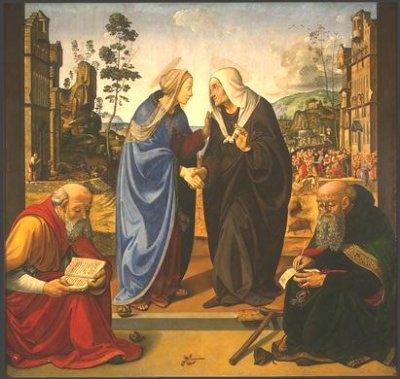Luke 1:39-56
Lesson 103
Lesson 103
Read both the "King James Bible" and the "New Living Translation."
In this lesson:
Re-read Luke 1:26-38 before continuing.
Mary's song of praise (1:46-55).
The "Magnificat" (Latin for magnify, to praise) reveals much about Mary and her faith.
Each sentiment expressed in the Magnificat also appears in the Old Testament.
Notice how Mary speaks of future events in the past tense.
This was a common practice to show that predicted events would undoubtedly come true.
Re-read Luke 1:26-38 before continuing.
Mary's song of praise (1:46-55).
The "Magnificat" (Latin for magnify, to praise) reveals much about Mary and her faith.
Each sentiment expressed in the Magnificat also appears in the Old Testament.
Notice how Mary speaks of future events in the past tense.
This was a common practice to show that predicted events would undoubtedly come true.
Mary visiting her cousin Elisabeth.
Both pregnant by divine intervention.
Both pregnant by divine intervention.
Study Tip:
Don't forget to read the margin notes in blue and click on the links.
Don't forget to read the margin notes in blue and click on the links.
Who was -
Abraham -
The father of all Jews (Romans 4:11-16; Galatians 3:7), spiritual forefather of Christians (Galatians 3:29), and a "friend" of God (2 Chronicles 20:7; Isaiah 41:8; James 2:23). Abraham was also called the "Father of a multitude," "exalted Father" and Abram (Genesis 15:1; 17:4-5). Born in Ur (present-day Iraq), Abraham is perhaps the greatest of the Old Testament personalities. His story is part of almost every eastern religion, including Islam where he is considered the father of all Arab peoples through his son Ishmael. A man of tremendous faith, Abraham left his home and family because God asked him to (Genesis 12:1; Acts 7:2-4). Then, God asked Abraham to sacrifice his son as a test. Believing God knew best, Abraham set off to obey (Genesis 22:1-10). As Abraham prepared to knife his own son, God sent an angel to save the boy (Genesis 22:11-13). Abraham's faith earned him God's promise (the Abrahamic Covenant) to make his descendants (the Israelites) a great and populous people (Genesis 17:2-7; 22:16-18; 26:4; 24) and to bless the Gentiles through him (Genesis 12:2-3; 15:1-21; 18:18; 22:18; 28:14; Exodus 32:13). Abraham's deeds frequently disappointed God, but he never lost his righteousness because it is never deeds that earn righteousness, it is faith (Genesis 15:6). Abraham died at the age of one hundred seventy-five (Genesis 25:7) and was buried alongside his wife Sarah in a cave at Machpelah (Genesis 23:9; 25:7-10). Centuries later a Christian church was built over the cave. Subsequently, the church was converted into an Islamic Mosque. Tracing Jesus' roots back to Abraham (Matthew 1:1-16) proves that Christ's lineage dates back to
the beginning of the Jewish nation. You can read more about Abraham in Genesis 11:26-25:34.
Abraham -
The father of all Jews (Romans 4:11-16; Galatians 3:7), spiritual forefather of Christians (Galatians 3:29), and a "friend" of God (2 Chronicles 20:7; Isaiah 41:8; James 2:23). Abraham was also called the "Father of a multitude," "exalted Father" and Abram (Genesis 15:1; 17:4-5). Born in Ur (present-day Iraq), Abraham is perhaps the greatest of the Old Testament personalities. His story is part of almost every eastern religion, including Islam where he is considered the father of all Arab peoples through his son Ishmael. A man of tremendous faith, Abraham left his home and family because God asked him to (Genesis 12:1; Acts 7:2-4). Then, God asked Abraham to sacrifice his son as a test. Believing God knew best, Abraham set off to obey (Genesis 22:1-10). As Abraham prepared to knife his own son, God sent an angel to save the boy (Genesis 22:11-13). Abraham's faith earned him God's promise (the Abrahamic Covenant) to make his descendants (the Israelites) a great and populous people (Genesis 17:2-7; 22:16-18; 26:4; 24) and to bless the Gentiles through him (Genesis 12:2-3; 15:1-21; 18:18; 22:18; 28:14; Exodus 32:13). Abraham's deeds frequently disappointed God, but he never lost his righteousness because it is never deeds that earn righteousness, it is faith (Genesis 15:6). Abraham died at the age of one hundred seventy-five (Genesis 25:7) and was buried alongside his wife Sarah in a cave at Machpelah (Genesis 23:9; 25:7-10). Centuries later a Christian church was built over the cave. Subsequently, the church was converted into an Islamic Mosque. Tracing Jesus' roots back to Abraham (Matthew 1:1-16) proves that Christ's lineage dates back to
the beginning of the Jewish nation. You can read more about Abraham in Genesis 11:26-25:34.




